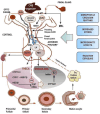Microgravity impairs endocrine signaling and reproductive health of women. A narrative review
- PMID: 40432927
- PMCID: PMC12106020
- DOI: 10.3389/fphys.2025.1558711
Microgravity impairs endocrine signaling and reproductive health of women. A narrative review
Abstract
During space exploration missions the organism is subjected to several challenges. Most of the studies have been performed on male health in space, leaving the focus on sex differences behind. With the development of new biological technologies, attention is now being paid more to how spaceflight conditions affect human reproductive health. In this review, the focus is on how weightlessness disrupts ovarian function and endocrine signaling by affecting the hypothalamic-pituitary-gonadal axis. Emerging evidence suggests that microgravity can impair estrogen production through the suppression of aromatase expression in granulosa cells. This condition leads to a hypo-estrogenic condition that harms the ovulation and the menstrual cycle. Likely, due to reduced estrogen availability, bone density, and cardiovascular health can consequently be severely involved. New studies focus on how space-related deregulation involving ovarian steroidogenesis look like the picture observed in the Polycystic Ovary Syndrome. These similarities open the perspective to counteract pharmacologically the observed abnormalities. However, our knowledge is severely constrained by the limited data available as well by the lack of proper experimental models of investigation. Indeed, much is required in order to acquire a full understanding of endocrine and functional changes occurring during microgravity exposure, including the joint effect of radiation and weightlessness that deserve to be thoroughly investigated to recognize the respective contribution of each one as well as the eventual synergies.
Keywords: aromatase; female fertility; ovarian function; steroidogenesis; weightlessness.
Copyright © 2025 Cutigni, Cucina, Galante, Cerri and Bizzarri.
Conflict of interest statement
The authors declare that the research was conducted in the absence of any commercial or financial relationships that could be construed as a potential conflict of interest.
Figures


Similar articles
-
Microgravity and Musculoskeletal Health: What Strategies Should Be Used for a Great Challenge?Life (Basel). 2023 Jun 21;13(7):1423. doi: 10.3390/life13071423. Life (Basel). 2023. PMID: 37511798 Free PMC article. Review.
-
Physiology, Ovulation.2023 May 1. In: StatPearls [Internet]. Treasure Island (FL): StatPearls Publishing; 2025 Jan–. 2023 May 1. In: StatPearls [Internet]. Treasure Island (FL): StatPearls Publishing; 2025 Jan–. PMID: 28723025 Free Books & Documents.
-
AMERICAN ASSOCIATION OF CLINICAL ENDOCRINOLOGISTS, AMERICAN COLLEGE OF ENDOCRINOLOGY, AND ANDROGEN EXCESS AND PCOS SOCIETY DISEASE STATE CLINICAL REVIEW: GUIDE TO THE BEST PRACTICES IN THE EVALUATION AND TREATMENT OF POLYCYSTIC OVARY SYNDROME--PART 1.Endocr Pract. 2015 Nov;21(11):1291-300. doi: 10.4158/EP15748.DSC. Endocr Pract. 2015. PMID: 26509855
-
The Minderoo-Monaco Commission on Plastics and Human Health.Ann Glob Health. 2023 Mar 21;89(1):23. doi: 10.5334/aogh.4056. eCollection 2023. Ann Glob Health. 2023. PMID: 36969097 Free PMC article. Review.
-
Insight into mechanisms of reduced orthostatic performance after exposure to microgravity: comparison of ground-based and space flight data.J Gravit Physiol. 1998 Jul;5(1):P85-8. J Gravit Physiol. 1998. PMID: 11542376
References
-
- Armstrong D. T., Goff A. K., Dorrington J. H. (1979). Ovarian follicular development and function (A. R. Midgley,, W. A. Sadler, eds.), New York: Raven Press, 169–182.
-
- Arnold C., Casaletto J., Heller P. (2024). Spaceflight disrupts gene expression of estrogen signaling in rodent mammary tissue. Med. Res. Archives 12 (3). 10.18103/mra.v12i3.5220 - DOI
Publication types
LinkOut - more resources
Full Text Sources

